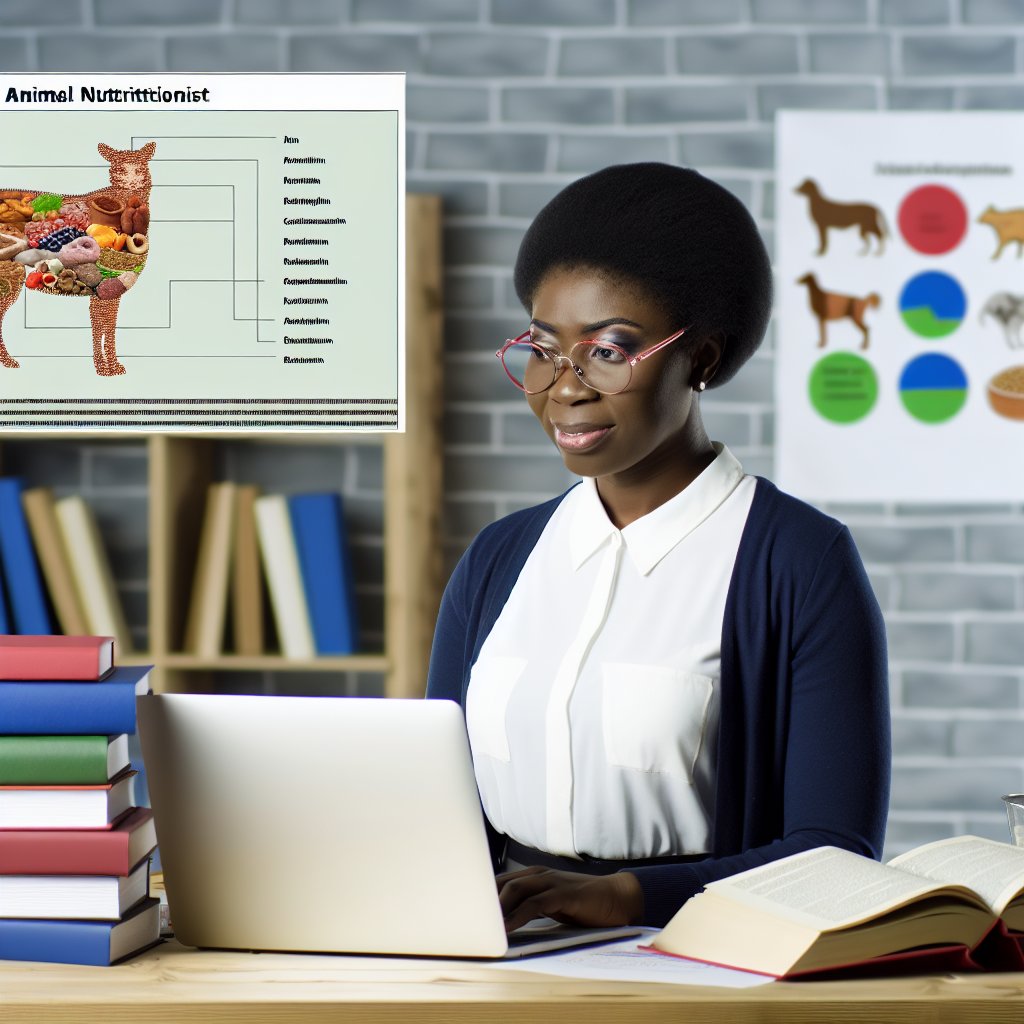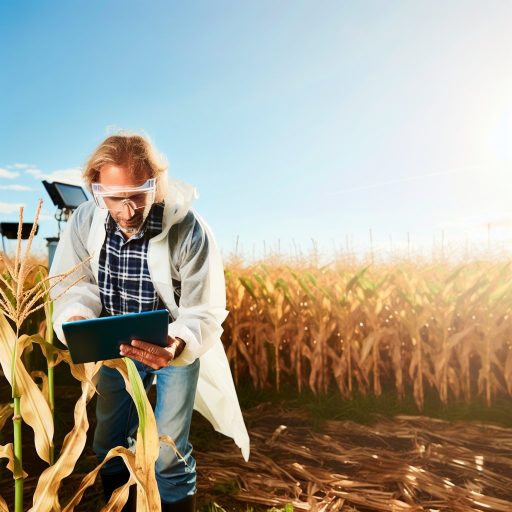Introduction
An animal nutritionist plays a crucial role in the agricultural industry by ensuring the health and well-being of animals through proper feeding and dietary practices.
Defining the Role
An animal nutritionist is responsible for formulating diets that meet the specific nutritional needs of various livestock and companion animals.
They conduct research to improve feeding practices, develop new dietary supplements, and address animal health issues.
Importance of Animal Nutrition
Animal nutrition is vital in the agricultural industry as it directly impacts the growth, reproduction, and overall performance of animals.
Proper nutrition can enhance animal productivity, reduce disease risk, and improve the quality of meat, milk, or other animal products.
Specific Responsibilities
Animal nutritionists analyze animal dietary requirements, design feeding programs, and monitor feeding trials to optimize animal health.
They work closely with farmers, veterinarians, and feed manufacturers to ensure that animals receive balanced and nutritious diets.
Moreover, they stay updated on the latest scientific research and technological advancements in animal nutrition to provide cutting-edge solutions.
Educational Background
Animal nutritionists typically have a strong educational background in fields such as animal science, biology, agriculture, or a related discipline.
A bachelor’s degree is usually the minimum requirement for entry-level positions in animal nutrition.
- Bachelor’s degree in animal science, biology, agriculture, or related field
- Advanced degree such as a master’s or Ph.D. in animal nutrition is preferred
- Courses in animal physiology, biochemistry, and nutrition are essential
Skills and Knowledge Needed
Aside from the educational background, animal nutritionists need to possess specific skills and knowledge to be successful in their role.
- Strong analytical skills to assess and formulate animal diets
- Knowledge of animal anatomy, physiology, and metabolism
- Understanding of nutritional requirements for different species of animals
- Excellent communication skills to work with clients and other professionals
- Problem-solving abilities to address nutritional challenges in animals
- Attention to detail to ensure accuracy in formulating diets
Certifications and Licenses
While certifications and licenses may not always be required to work as an animal nutritionist, having them can demonstrate expertise and enhance career opportunities.
- American College of Animal Nutrition (ACAN) certification
- Registered Animal Nutritionist (RAN) credential
- Licenses from state boards of veterinary medicine or agriculture
- Continuing education credits to maintain certification and stay current
A career as an animal nutritionist requires a solid educational foundation, specific skills and knowledge related to animal nutrition, and potentially certifications or licenses to enhance credibility in the field.
Work Environment and Daily Tasks
An animal nutritionist works in a variety of settings including farms, laboratories, zoos, pet food companies, and research institutions.
They may also spend time in office settings conducting research, analyzing data, and creating nutritional plans for animals.
Animal nutritionists are responsible for formulating diets that meet the nutritional needs of various animals.
They conduct research to understand the dietary requirements of different species and develop feeding programs accordingly.
They work closely with veterinarians, animal scientists, and farm managers to ensure optimal animal health and performance.
Animal nutritionists can work with a wide range of animals including livestock such as cows, pigs, and chickens.
They may also be involved in formulating diets for pets like dogs, cats, and birds.
Transform Your Career Today
Unlock a personalized career strategy that drives real results. Get tailored advice and a roadmap designed just for you.
Start NowOther animals they work with include zoo animals, wildlife, and even exotic animals in captivity.
See Related Content: Effective Communication for Pest Control Advisors
Challenges and Opportunities in the Field
Challenges:
Animal nutritionists may face several challenges in their work, including:
- Changing market trends and consumer demands
- Balancing nutritional needs with cost considerations
- Ensuring compliance with regulations and industry standards
- Dealing with emerging diseases and health issues in animals
- Managing sustainability and environmental concerns
Opportunities for Career Growth:
Despite the challenges, there are ample opportunities for career growth and advancement in the field of animal nutrition:
- Specializing in a particular species or type of animal
- Working with research institutions to develop new diets and supplements
- Consulting for large-scale farms or animal feed companies
- Teaching and training future animal nutritionists
- Exploring opportunities in pet nutrition and wellness
Current Trends and Developments:
There are several trends and developments that may impact the role of an animal nutritionist in the future:
- Increased focus on personalized nutrition for animals
- Advancements in technology for formulating and testing feed
- Growing awareness of the importance of nutrition in animal health
- Expanding research on the connection between diet and animal behavior
- Integration of sustainable practices in animal feed production
Delve into the Subject: Irrigation Specialist: Continuing Education and Training
Collaboration in Animal Nutrition
In the field of animal nutrition, collaboration with other professionals is essential for success.
Animal nutritionists often work closely with veterinarians, farmers, and other professionals to ensure the health and well-being of animals.
This interdisciplinary collaboration allows for a more holistic approach to addressing animal nutrition issues.
Importance of Collaboration
Collaboration between animal nutritionists and veterinarians is crucial in diagnosing and treating various health conditions in animals.
Veterinarians provide valuable insights into animal health and can help identify any underlying medical issues that may be affecting their nutritional needs.
Farmers play a significant role in animal nutrition as they are responsible for the day-to-day care and feeding of animals.
By working collaboratively with farmers, nutritionists can develop tailored feeding programs that meet the specific nutritional requirements of each animal species.
Interdisciplinary collaboration is also important in addressing complex nutrition issues that may require expertise from multiple professionals.
For example, in cases where animals are suffering from malnutrition due to poor quality feed, collaboration between nutritionists, veterinarians, and feed suppliers is essential to improve the quality of feed and address the animals’ nutritional needs.
Successful Collaborations
One example of a successful collaboration in the field of animal nutrition is the partnership between nutritionists and researchers in developing new and innovative feed formulations.
By working together, these professionals can conduct research studies to evaluate the effectiveness of various feed ingredients and formulations.
This leads to the development of new feeding strategies that optimize animal health and performance.
Another successful collaboration is the partnership between nutritionists and animal behaviorists in addressing feeding behavior issues in animals.
Showcase Your Business Today
Reach thousands of readers actively exploring professional services. Publish your business profile and grow your audience now.
Publish NowBy understanding the psychological and behavioral factors that influence an animal’s feeding habits, nutritionists and behaviorists can work together to develop feeding programs that promote healthy eating behaviors and prevent feeding-related disorders.
Overall, collaboration between animal nutritionists, veterinarians, farmers, and other professionals is essential for ensuring the health and well-being of animals.
By working together, these professionals can develop innovative feeding strategies, address complex nutrition issues, and ultimately improve the overall quality of life for animals in their care.
Explore Further: Innovative Irrigation Techniques for Farm Efficiency

Animal nutrition plays a crucial role in the overall health and performance of animals.
An animal nutritionist is responsible for developing specialized diets to meet the nutritional needs of different animals.
They ensure animals receive the necessary nutrients for optimal growth and well-being.
Direct Correlation between Animal Nutrition and Health
Proper nutrition is essential for maintaining the health and performance of animals.
A balanced diet provides the necessary energy, protein, vitamins, and minerals required for growth, reproduction, and overall well-being.
Role of an Animal Nutritionist
An animal nutritionist plays a pivotal role in formulating diet plans tailored to meet the specific needs of different animals.
By assessing the nutritional requirements of individual animals, nutritionists can develop custom diets that optimize health and performance.
Developing Specialized Diets
Animal nutritionists work closely with farmers, veterinarians, and animal scientists to create specialized diets that address the unique nutritional needs of animals.
These diets may vary based on factors such as species, breed, age, weight, and activity level.
Real-Life Examples of Improved Animal Health
Proper nutrition has been shown to have a significant impact on animal health and productivity.
For example, dairy cows that receive a balanced diet rich in essential nutrients produce more milk and are less likely to develop health issues such as metabolic disorders.
In the poultry industry, chickens that are fed a diet high in protein and vitamins grow faster and have a lower mortality rate.
Similarly, racehorses that are provided with a diet tailored to meet their energy requirements perform better on the track and are less prone to injuries.
Importance of Tailored Nutrition for Animal Health
Animal nutritionists play a vital role in ensuring the health and performance of animals by developing specialized diets that meet their nutritional needs.
By understanding the direct correlation between nutrition and health, nutritionists can optimize animal well-being and productivity.
You Might Also Like: Benefits of Artificial Insemination in Livestock
Role of an Animal Nutritionist
An animal nutritionist plays a crucial role in formulating balanced diets for animals.
They ensure the well-being and health of animals through specialized nutrition plans.
The importance of their role cannot be overstated in maintaining healthy livestock and pets.
To further explore this field, individuals can pursue courses in animal nutritionism and related disciplines.
By understanding the role of an animal nutritionist, we can appreciate their impact on animal welfare.
It is vital to recognize their expertise and contributions to the care and well-being of animals.
Let’s continue to support and learn more about the field of animal nutritionism for the betterment of animals everywhere.
Additional Resources
Animal nutritionist job profile | Prospects.ac.uk
Amanda Ardente, DVM, PhD – Ardente Veterinary Nutrition LLC
[E-Books for Sale]
The Big Book of 500 High-Paying Jobs in America: Unlock Your Earning Potential
$19.99 • 500 High-Paying Jobs • 330 pages
Explore 500 high-paying jobs in America and learn how to boost your career, earn more, and achieve success!
See All 500 High-Paying Jobs of this E-Book
1001 Professions Without a Degree: High-Paying American Jobs You Can Start Now
$19.99 • 1001 Professions Without a Degree • 174 pages
Discover 1001 high-paying jobs without a degree! Unlock career tips, skills, and success strategies for just $19.99!




